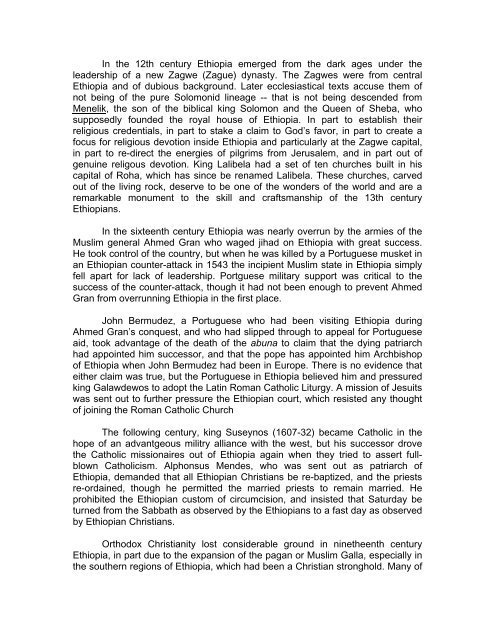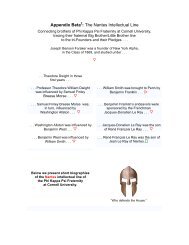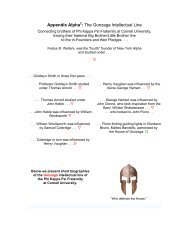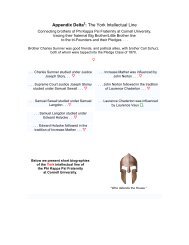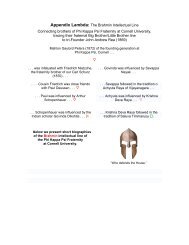Gondar - Phi Kappa Psi
Gondar - Phi Kappa Psi
Gondar - Phi Kappa Psi
You also want an ePaper? Increase the reach of your titles
YUMPU automatically turns print PDFs into web optimized ePapers that Google loves.
In the 12th century Ethiopia emerged from the dark ages under the<br />
leadership of a new Zagwe (Zague) dynasty. The Zagwes were from central<br />
Ethiopia and of dubious background. Later ecclesiastical texts accuse them of<br />
not being of the pure Solomonid lineage -- that is not being descended from<br />
Menelik, the son of the biblical king Solomon and the Queen of Sheba, who<br />
supposedly founded the royal house of Ethiopia. In part to establish their<br />
religious credentials, in part to stake a claim to God’s favor, in part to create a<br />
focus for religious devotion inside Ethiopia and particularly at the Zagwe capital,<br />
in part to re-direct the energies of pilgrims from Jerusalem, and in part out of<br />
genuine religous devotion. King Lalibela had a set of ten churches built in his<br />
capital of Roha, which has since be renamed Lalibela. These churches, carved<br />
out of the living rock, deserve to be one of the wonders of the world and are a<br />
remarkable monument to the skill and craftsmanship of the 13th century<br />
Ethiopians.<br />
In the sixteenth century Ethiopia was nearly overrun by the armies of the<br />
Muslim general Ahmed Gran who waged jihad on Ethiopia with great success.<br />
He took control of the country, but when he was killed by a Portuguese musket in<br />
an Ethiopian counter-attack in 1543 the incipient Muslim state in Ethiopia simply<br />
fell apart for lack of leadership. Portguese military support was critical to the<br />
success of the counter-attack, though it had not been enough to prevent Ahmed<br />
Gran from overrunning Ethiopia in the first place.<br />
John Bermudez, a Portuguese who had been visiting Ethiopia during<br />
Ahmed Gran’s conquest, and who had slipped through to appeal for Portuguese<br />
aid, took advantage of the death of the abuna to claim that the dying patriarch<br />
had appointed him successor, and that the pope has appointed him Archbishop<br />
of Ethiopia when John Bermudez had been in Europe. There is no evidence that<br />
either claim was true, but the Portuguese in Ethiopia believed him and pressured<br />
king Galawdewos to adopt the Latin Roman Catholic Liturgy. A mission of Jesuits<br />
was sent out to further pressure the Ethiopian court, which resisted any thought<br />
of joining the Roman Catholic Church<br />
The following century, king Suseynos (1607-32) became Catholic in the<br />
hope of an advantgeous militry alliance with the west, but his successor drove<br />
the Catholic missionaires out of Ethiopia again when they tried to assert fullblown<br />
Catholicism. Alphonsus Mendes, who was sent out as patriarch of<br />
Ethiopia, demanded that all Ethiopian Christians be re-baptized, and the priests<br />
re-ordained, though he permitted the married priests to remain married. He<br />
prohibited the Ethiopian custom of circumcision, and insisted that Saturday be<br />
turned from the Sabbath as observed by the Ethiopians to a fast day as observed<br />
by Ethiopian Christians.<br />
Orthodox Christianity lost considerable ground in ninetheenth century<br />
Ethiopia, in part due to the expansion of the pagan or Muslim Galla, especially in<br />
the southern regions of Ethiopia, which had been a Christian stronghold. Many of


